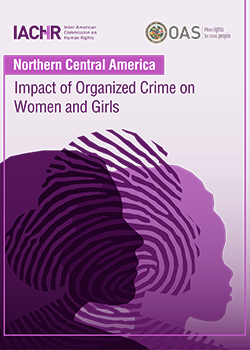
Press Release
IACHR Presents Report on Impact of Organized Crime on Women, Girls, and Adolescents
April 24, 2023
Contact info
IACHR Press Office
Distribution List
Washington, D.C.—The Inter-American Commission on Human Rights (IACHR) presented a new thematic report: “The Impact of Organized Crime on Women, Girls, and Adolescents in the Countries of Northern Central America.” The report aims to analyze the various forms of violence and discrimination to which women and girls are exposed in the contexts of violence and insecurity that prevail in these countries; the gender dynamics that are a hallmark of the actions of gangs or criminal groups; and the State’s responses to this issue. The report examines these topics in light of inter-American obligations and standards on the matter.
The starting point for the publication was the lack of in-depth analyses of the connections between the actions of organized criminal groups and gender-based violence against women. In its report on Violence and Discrimination Against Women and Girls (2019), the IACHR identified that the high levels of gender violence experienced by women in Guatemala, Honduras, and El Salvador are compounded by the dehumanizing violence perpetrated by maras and gangs. It also underlined the heightened risk that women face due to anti-crime policies and the specific shortfalls in how violence against women is addressed in the context of organized crime.
“Violence against women has not yet been analyzed in depth in the context of organized crime, nor has it been tackled appropriately by States. The literature and studies on organized crime have not applied a gender approach, nor have they acknowledged the role of power and gender relations in these violent contexts. We hope this report will contribute to improving understandings of this state of affairs and help States to address it, in line with Inter-American standards,” said Commissioner Julissa Mantilla Falcón, IACHR Rapporteur on Women’s Rights.
To this end, this report examines the impact of organized crime on women, girls, and adolescents, as well as State responses in Honduras, Guatemala, and El Salvador. The report begins by analyzing women’s rights in the contexts of insecurity and violence in these countries. It then examines the gender dynamics that permeate criminal and gang structures and explores the various forms of violence to which women, girls, and adolescents are exposed in these countries. It also looks at States’ responses to this phenomenon within the framework of their international obligations.
“We have been informed of atrocious acts of violence against women in relation to organized criminal groups, many of which concerned girls and adolescents. Forced unions, murders, disappearances, torture, sexual violence, human trafficking, or forms of detention analogous to slavery have been reported to us. These circumstances are unfolding in a context of weakened democratic institutions in which corruption prevails, which has a negative impact on States’ capacity to prevent and punish violence against women, girls, and adolescents,” said Commissioner Esmeralda Arosemena de Troitiño, Rapporteur on the Rights of the Child.
The document ends with a series of recommendations addressed to the States of Honduras, Guatemala, and El Salvador, such that they may advance toward guaranteeing the right of women, girls, and adolescents to live a life free of violence. On this point, the IACHR once again expressed its willingness to provide the States of Northern Central America with technical cooperation and continue its dialogue with other States in the region that face similar challenges, in compliance with its mandate to promote and guarantee the rights of all people.
Finally, the IACHR is grateful for the support of the Swiss Agency for Development and Cooperation (COSUDE) in the preparation of this report, which is part of a project to strengthen governance and the protection of human rights in the countries of Northern Central America, with an emphasis on vulnerable populations.
A principal, autonomous body of the Organization of American States (OAS), the IACHR derives its mandate from the OAS Charter and the American Convention on Human Rights. The Inter-American Commission has a mandate to promote respect for and to defend human rights in the region and acts as a consultative body to the OAS in this area. The Commission is composed of seven independent members who are elected in an individual capacity by the OAS General Assembly and who do not represent their countries of origin or residence.
No. 073/23
5:20 PM


